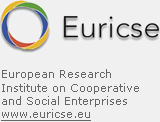 Dr. Salvatore Drago (University of Messina, Centro Studi "Pio La Torre" and IIPPE Fellow) organises a panel on "Economy and Religions in Historical and Contemporary Perspectives: Crisis of Capitalism, Ethics and Development" within the Fifth International Conference in Political Economy "The Crisis: Scholarship, Policies, Conflicts and Alternatives" that will take place in Naples, Italy, on September 16-18, 2014. The deadline for abstract submission is March 25, 2014.
Dr. Salvatore Drago (University of Messina, Centro Studi "Pio La Torre" and IIPPE Fellow) organises a panel on "Economy and Religions in Historical and Contemporary Perspectives: Crisis of Capitalism, Ethics and Development" within the Fifth International Conference in Political Economy "The Crisis: Scholarship, Policies, Conflicts and Alternatives" that will take place in Naples, Italy, on September 16-18, 2014. The deadline for abstract submission is March 25, 2014.
In light of the challenges that contemporary economy and society launches, this Panel aims to analyzes the primary role played by Religions – especially Christianity, Protestantism and Islam – for the formation of an alternative thought in the context of European history form the sixteenth century to the present day. The study of this topic, means the study of essential elements: such as to illuminate the roots of the concrete-historical and foundational aspects of Ethical Economy characterized by promoting a supportive economic system based on equality-capitalist economic and social well-being that since the last decade has begun to establish itself within many logical theory; to redeem the economic thought of its identity exclusively pragmatic, rational and mathematical-statistics; and to read the Religion as an integral part of every aspects of human relatedness, including the economic sphere of production and trade. In this sense, it becomes critical to stimulate the Public role of Religions, and evaluate all opportunities that can provide for the construction of a more collective well-being, against all forms of fundamentalism.
The recent economic and financial crisis, in all its economic and social implications, in poor and rich countries, becomes a crucial opportunity for an reflection and discernment about errors and distorting “hidden truths” of Capitalism and the need to start a new and different future, capable to change the method and the paradigm of the modern economy and to think of it in terms of values and “religious”, especially after the current revolts of the “Arab Spring”. The European Union, is not only geography, but also space, time, history, culture and spirituality that make up and break down into a variable mosaic. It is Grrek philosophy, Roman law and Arab culture. The Mediterranean Area becomes a new line of action of economic policies by European Union, and a new frontier.
In this context, talk about Religions in the economy, does not mean to attribute to it the restrictive task of production and redistribution in the name of a return to the past now gone. The inclusion of Religions in the normativity of economic dialectic should not only be in its theoretical terms, but also have the strentgh of a practical application of its axioms and its principles, in the name of targets of values and social moral.
In fact, the main objective of Panel consists to see mainly the close ties between the “homo oeconomicus” and the “homo religious” that crossed our history and identity.
Specifically, the Reform of 1517 of M. Lutero, G. Calvino and U. Zwingli, born from a link between Christian tradition and anti-papal modernity, valorized an individual and social ethics finalized at the “secularism” of the policy and of the economy. Yesterday like today, in fact, the protestant influences for the formation of an economic thought was based on following aspects: vocational Christian awareness connected at the secular and profane aspect too; the work and the entrepreneurship understood as expression of cult of God; the concept of “Beruf” understood as vocation and position in the society to comply with a sense of duty; the riches to enhance and administer with sense of “social” responsibility; and promotion of correct forms of Capitalism.
Christianity, on the other hand, considered the economy like means of aggregation and civilization of world's people. The fundamental points are still today the conception of private property and of the means of production finalized at the realization of a Common and social good; balance between public and private sphere for a realization of economic development; valorization of the principles of Common good, universal destination of goods and resources, subsidiarity, solidarity and charity in the normal and ordinary management of economy and entrepreneurship.
Also the Islamic conception has in common with the other Religions many ethical and social principles. Between radical liberalism and radical socialism, the Islamic economic thought offers an alternative way that encompasses revised aspects of both systems. The Islam, like other Religions but with particular forms, proposes instances of social justice and of economy starting from the assumption that the men should be at the centre of the economic and political asset.
The role of Religions for the formation of a new economic thought and of a new guidelines of governmental economic policies in European ambit of globalization, in recent years has been proposed and validated by many economists: such as A. Sen, S. Zamagni, L. Bruni, D. Rodrik, J. Viner, D. McCloskey, J. P. Fitoussi and many others.
Call for papers
In this sense, we would particularly encourage contributions that explore every aspect of the links between economy and Religions, in theoretical, practical and purposeful forms, in relation to new models of socio-economic development and a new economic thinking, and from historical and contemporary point of reflection.
Abstract (max 500 words) must be submitted before 25 March 2014 to Salvatore Drago: [email protected]
Working group on the “Political Economy and Religions: History and Perspectives”
Important note: It is our intention to form a working group on the “Political Economy and Religions: History and Perspectives”, within IIPPE research (International Initiative Promoting Political Economy, SOAS, University of London). Please contact Salvatore Drago ([email protected]) if you are interested in participating in such a working group even if you are unable to attend the Conference.








